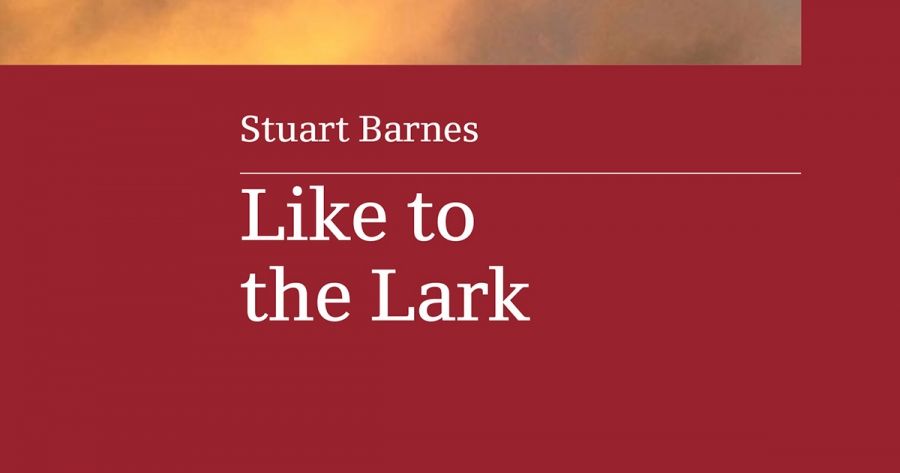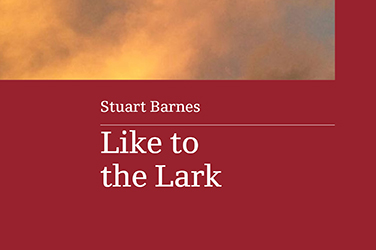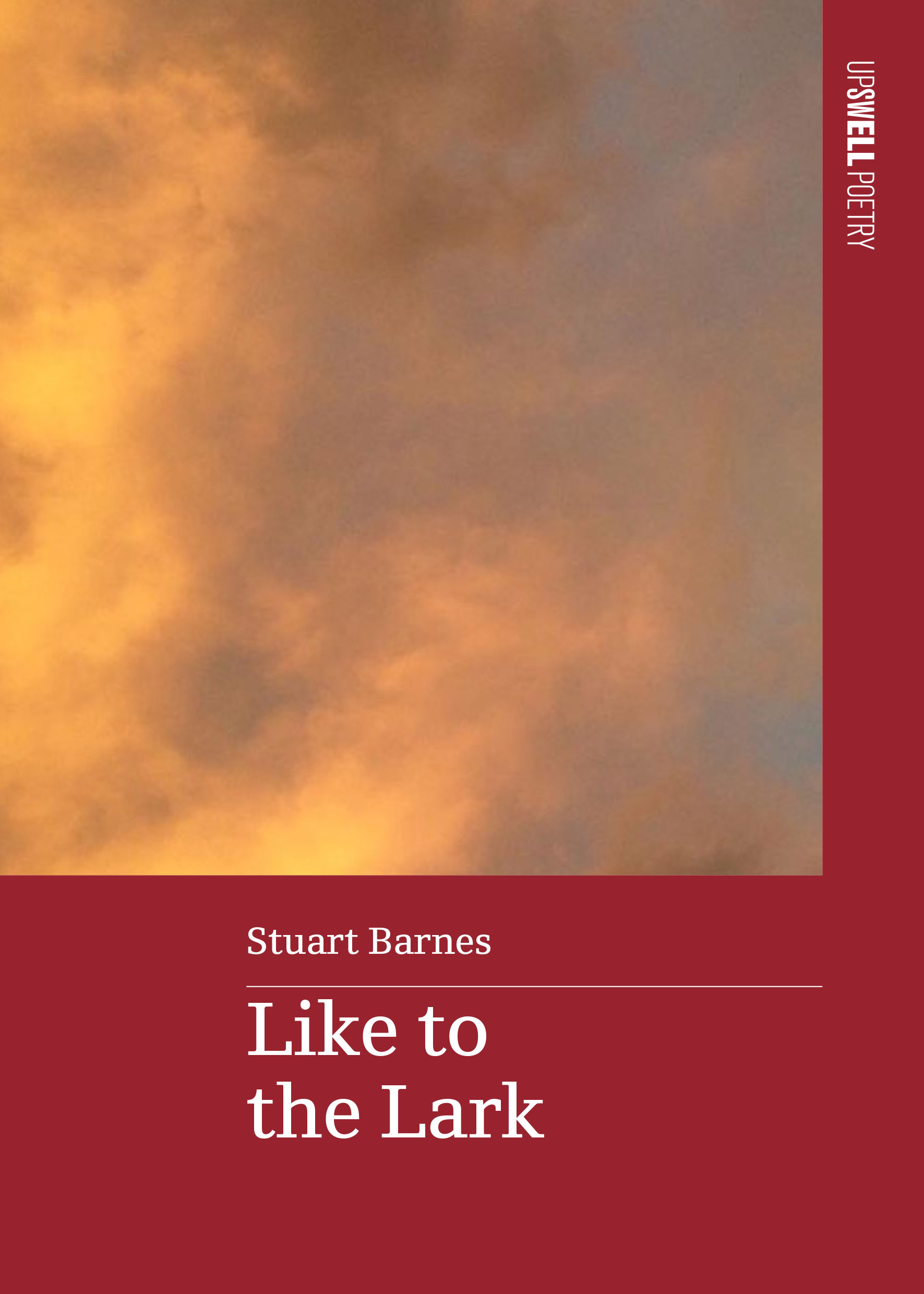
- Free Article: No
- Contents Category: Poetry
- Review Article: Yes
- Article Title: Glittering diadem
- Article Subtitle: The paraphernalia of poetry
- Online Only: No
- Custom Highlight Text:
A book review is a review of a book. This sounds obvious enough but can put the reviewer in a position they would not wish to be in as a more casual reader: that of not just reading a book’s poems, but also feeling a need to attend to the rest of the book – that is, the book’s paratexts.
- Featured Image (400px * 250px):

- Alt Tag (Featured Image): Michael Farrell reviews 'Like To The Lark' by Stuart Barnes
- Book 1 Title: Like to the Lark
- Book 1 Biblio: Upswell Publishing, $24.99 pb, 129 pp
- Book 1 Cover Small (400 x 600):

- Book 1 Cover (800 x 1200):

By now the reader of this review is probably in a similar mind frame. So here goes: rock and roll. And the first poem (‘Off-world Ghazal’) does have a rock and roll vibe: being a ghazal of which the first line, and the second line, and every second line, in each subsequent couplet, ends with the word ‘World’. Here are the first two: ‘Are you ready for the round-up, World? / Put your atlas down and feet up, World. // Give me the keys, the GPS. You / thrashed the hell out of the pickup, World.’ ‘Off-world Gahzal’ begins with its own epigraph, from Judith Wright (allowing Barnes to quote from Wright’s lines within the poem, without needing to cite them – as well as to acknowledge Wright’s Australian precedence in using this Arabic form – after all, these mini-forms do have their uses), and its first lines let us know that we are in the contemporary: a world not necessarily as polite as the book’s paratextual mass might have us believe.
Another popular form with repetitive line endings is that of the sestina. Conventionally, these feature a series of six end words in rotation, but the lines in Barnes’s ‘Sestina: Pain’ ends with the word ‘pain’ only; about half of ‘Sestina: Rape’ ends with the word ‘rape’. In other words, what appears to be highly casual, formally, is thematically over-determined. In the front pages, Ali Alizadeh commends Barnes’s joy, in using poetic form, in a Barnesian paragraph: indeed, Alizadeh uses the word ‘joy’ five times. But I can’t quite buy it: when some of the (joyful?) difficulties of the sestina are evaded, there is, in Like to the Lark, a difficult (for me) to ignore thematic (or narrative) insistence on fare from joyful aspects of life (often specifically contextualised gay life): pain, rape, HIV/AIDS, and homophobia.
Kate Lilley, another endorser, praises Barnes’s ‘bravura queer energies’. While we can’t quite take the queer aspect of his work for granted, ‘bravura’ is a descriptor that resonates with me: in, for example, ‘The Pardoner’, with its post-Hopkins, post-Muldoon language alertness. As a queer poem, ‘The Pardoner’ is not negligible, either: it mediates the subject of gay rape, through a cited earlier example (Dustin Brookshire’s chapbook To the One Who Raped Me – a dedication, and an explicit allusion, means that Barnes names this text twice). The poem’s concluding words suggest that it is based on the narrator’s own experience. (This is confirmed in the ‘Notes on Form’, which, oddly, mediate the poem further, retrospectively claiming the experience of being raped for the author; to adapt ‘Ern Malley’, non-fiction ‘is not easy’. The ‘Notes on Form’ don’t seem particularly necessary, since they are followed by another section titled ‘Notes’, which also mention aspects of form.) Elsewhere in the poem, Barnes writes: ‘Entirely / guilty of subversion / I’ve murmured He loves me, he / loves me lots, quilting GRINDR’s fakery.’ (GRINDR recurs in the grimly obvious poem ‘GRINDR’, which deals metaphorically with meat).
The idea of queer as subversion is aimed at an aspect of contemporary queerness itself: that is, at the ubiquitous dating app, with an additional allusion to quilting (as gender slippage, and/or AIDS memorialising) for good measure. Barnes, in traditional gay fan or queen style, borrows terms from other contexts, making what might be called a kind of accepted exaggeration (‘I’ve always adored a deft desert’, from ‘Desert’). Asserting the adoration of form is an ingenious poetics move, in terms of lyric, in a sense reshuffling its romantic and classical aspects. It also permits a form of camp slapdash, or piss elegance.
It’s a Barnes M.O.: to load/lode his poems beyond any sense of linear irony – resisting the page’s flatness almost successfully – so that they become potential objects, or creatures, glittering diadem-cum-chameleons, to be, possibly, picked up (most definitively demonstrated by the boy-shaped ‘Boys Don’t Cry’, which directly mimics a promotional Robert Smith photograph). Barnes’s punning is a revealing aspect of his poetics: his inveterate optimism, his (al)truistic morality. Whether the glitter indicates gold or not, there is a whole lot of complications behind/beyond every surface (see, for example, ‘Binary Tree Poem’). Nothing (no one) just shines. The language of salivation – the morning glory on the trellis – will probably always be with us, at least until the codes of queer language wither away. But whether we need so much extra-poetic unpacking, so many bags and verifying documents, I question.


Comments powered by CComment